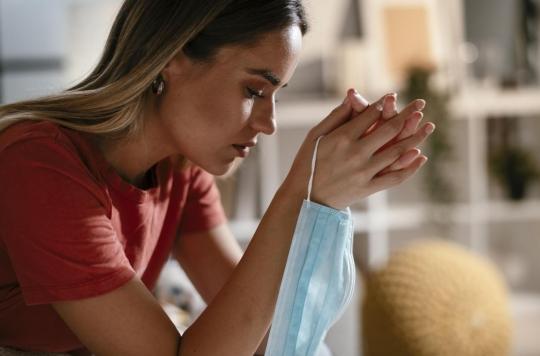The Covid-19 crisis has not been without consequences for our mental health. According to the WHO, cases of depression and anxiety have jumped 25% since the beginning of 2020.

- From April 2022, the “MonPsy” system will allow eight sessions with the psychologist to be reimbursed per year. The fixed prices are 40 euros for the first session and 30 euros for the following ones.
- According to Inserm, 15 to 20% of the general population has been or will be affected by a depression disorder during their lifetime.
Confinements, isolation, fear for loved ones and fear of financial difficulties… Since the start of the Covid-19 pandemic in March 2020, our mental health has undoubtedly been hit hard. A brief from the World Health Organization (WHO) made public on Wednesday March 2 confirms this.
According to the public health institution, which is based on the review of several studies, cases of anxiety and depression have increased by 25% worldwide. The health crisis has also hindered access to mental health services, which has probably had consequences on the increase in suicidal behavior and self-harm, particularly among young people.
Women and young people on the front line
In more detail, according to the WHO, cases of major depressive disorders and anxiety disorders have increased by 27.6% and 25.6% respectively worldwide. It is “a very significant increase”judged Brandon Gray, of the department mental health and use of psychoactive substances of WHO, which coordinated the report.
The countries hardest hit by the pandemic are also those where the prevalence of these mental disorders is the highest. This is the case for countries in the Middle East, South America and South Asia.
The WHO also reports that “women were more affected than men, and younger people, especially 20-24 year olds, were more affected than older age groups”.
Anxiety, depression, suicidal thoughts and sleep disturbances
The WHO is not the only one to highlight the harmful consequences that the pandemic has had on our mental health. Last October, an Australian study published in The Lancet drew the same conclusions after assessing the global impacts of the pandemic on major depressive and anxiety disorders in 204 countries and territories.
The results showed a 28% increase in major depressive disorders and 26% in anxiety disorders. Women, here too, were the first concerned. “The Covid-19 pandemic has exacerbated many existing inequalities and the social determinants of mental illness, estimated the co-author of the study, Alize Ferrari. Unfortunately, for many reasons, women have been more likely to be more affected by the social and economic consequences of this pandemic.”
France has obviously not been spared, as a survey by Public Health France revealed in December: nearly a third of French people, or 23%, have an anxious state, or 9 points more compared to the level outside the epidemic. .
The health authority also assesses that 18% of those questioned show signs of a depressive state, a level higher by eight points compared to the level outside the epidemic. Finally, she notes an increase in suicidal thoughts and sleep disturbances.

.














